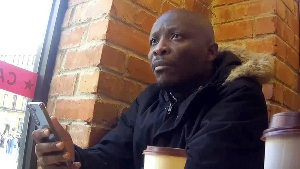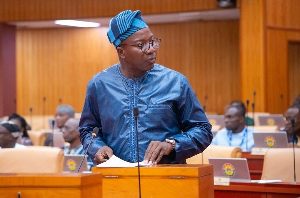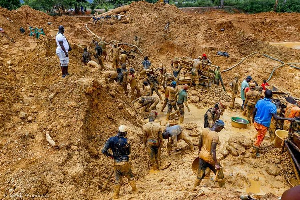Petty trading is gradually becoming a means of adapting to climatic change for farmers in Africa.?High yielding crops and emerging new markets are no longer exciting as changing climatic conditions are fast pushing smallholder farmers away from the land to the market.?
Farm dresses are difficult to locate in homes known to be “farm lovers” and the cutlass and hoe are being given new roles other than working on the farm.?In most countries on the Continent, old farmlands have become homes and fuel filling stations, indicating how subsistence farmers continue to be thrown out of the farming business.
In Ghana, for instance, it is common to see farmers and their farms washed away by floods yearly with its accompanying socio-economic hardships. Similar stories abound around the continent.?
Widespread water stress, prevalence climatic related diseases and reliance on rainfall are exacerbating the situation, threatening food security for the continent.
?Subsistence farmers in the countryside continue to migrate to Accra, Kumasi, Takoradi and other regional capitals for small scale businesses due to uncertain rain patterns. They simply buy items and re-sell them for survival. Some take small loans meant for farmers and invest them into other ventures, especially fast moving consumer goods, for quick returns. Atanor, 50, a vegetable farmer in Ho described it as being creative and economically sensible. The smile on her face looked quite genuine as she convinced herself that buy- and- sell is better than farming.
?“Brother X sell toothpaste and many other things,” she told me, still smiling and exposing her beautiful gap teeth. I soon got to know Atanor dropped the cutlass and hoe a few months ago and got for herself a metal container for her new business – a provision shop.?Atanor complained of lack of access to subsidized fertilizer and climate resistant crops, which pushed her into petty trading.
?“Galamsey” or illegal gold mining is another venture that is taking farmers away from the land. In gold mining areas in Ghana, smallholder farmers have sold their farms to “galamseyers” whose activities have destroyed the land. ? A large acreage of farmlands have fallen victim to theses exploits with some farmers joining the search for gold hoping to make more money than they could ever earn from their farming activities.?In the Republic of Togo, some cereal and vegetable farmers have also dropped the cutlass and hoe for “Okada," a thriving commercial motorbike transportation business.?
Ataga Yao, a 55year old father of eight and a cereal farmer said, “Okada” business is more predictable than the weather. He said that since he joined the “Okada” business, none of his kids was sent home for school fees as used to be the case.?His brother, Kokuvi, 42, a fisherman, said he had to be doing “Okada” as part time alongside fishing to stay “afloat”.
?Another farmer turned Okada operator, Besa, 38, said he tried working out some backyard garden in place of his main farms but it could not work because before he reached the hoe, a passenger calls and that the hoe has now become more of a tool for digging hole for toilet.?Maastricht School of Management and Maastricht University Researchers say over 40 per cent of rural African households run non-farm businesses, accounting for more than, a third of income in some cases with about half of this work taking place in or around the home and about a fifth in a market. ?
This gives credence to the fact that more farmers are leaving production for selling.?Unfortunately, policy makers and implementers continued to pay lip-service to the sector, thus making farmers vulnerable to climatic shocks. ?
A study, conducted in 2008 to verify how many African countries had met their 2003 commitment to dedicate more than 10 per cent of national expenditure to agriculture, found that only 19 per cent had met this goal (Economic Report on Africa, 2009).?
It is worth stating that Africa has approximately 33 million small farms, representing 80 per cent of all farms in the region, with smallholder farmers accounting for as much as 90 per cent of agricultural produce on the continent, according to African Smallholder Farmers Group.?
The fear, however, is that food security could suffer given the current situation with smallholder farmers shifting to other perceived lucrative sectors. The Food and Agriculture Organization (FAO) in 2012 said almost all the 852 million hungry people in the World live in developing countries. This, according to the FAO, represents 15 per cent of the population of developing counties.?
Mr John Tsrakasu, an Agronomist said the picture of peasant farmers in Africa is simply “backwardness” for which reason they are referred to as the “poor farmer”.?He attributed the challenges to economic policies in Africa which, he said, do not encourage production.?
“Our leaders themselves are into buying and selling. They do not believe in production and are putting up supermarkets; so why won’t the peasant farmer?” Mr Tsrakasu asked. ?Dr. Makhtar Diop, World Bank Vice President for Africa believes in the potentials of the Continent to feed its people well. ?
The challenge, however, seems to be how to plot the road-map to achieving this goal. Leaders on the Continent must give a chance to, and believe in, agriculture-led development and empower farmers on the Continent to expand the economy to ensure food security and safeguard the lives of about 239 million people in Sub-Saharan Africa who live in hunger.
Opinions of Saturday, 5 July 2014
Columnist: GNA














